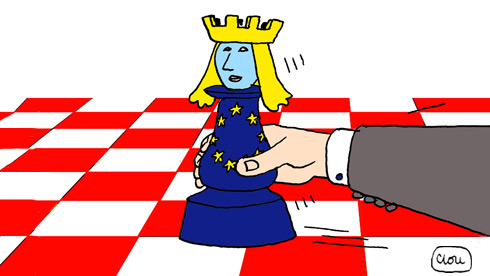The Eurozone crisis and the ensuing economic woes are monopolising the attention of European leaders, yet enlargement continues apace. On July 1, Croatia will become the 28th member of the European Union. The EU's historic mission into its hinterlands and to its boundaries must not overshadow the strain the European project is under and the scepticism of public opinion towards it.
The previous entry, in early 2007, revealed a certain lack of preparation on the part of the new members. Romania and Bulgaria were far from the level required, particularly regarding the rule of law and the battle against corruption and organised crime. To make up for the delay in meeting their commitments, the EU Commission had to devise a cooperation and monitoring system but, even today, neither Bulgaria nor Romania are capable of joining the Schengen Area.
Certainly, the EU has learned some lessons from this and proceeded cautiously when it came to Croatia. The number of issues addressed during the entry negotiations was increased and Brussels designed a specific, reinforced monitoring system. The idea was to allow the Commission to evaluate to what degree the entry requirements were being respected. Croatia's entry into the Schengen Area is also subject to specific requirements.
If the March 28 monitoring report is to be believed, Croatia is ready to join the EU. The EU Heads of state and government approved the entry more than a year ago. The entry treaty for Croatia is on course for ratification and has been ratified by 19 of the 27 member states.
Respecting the rule of law
Nonetheless, the report calls attention to the progress required to improve the judiciary. More specifically, it calls for the need to respect the rule of law and the independence of the judiciary. In Croatia, as in Romania or even Hungary, cases concerning former prime ministers were not always carried out according to European legal standards.
The case of Ivo Sanader, the head of Croatia's government from 2003 to 2009 is telling. The trial in which he was found guilty of corruption in an affair involving the takeover of Hungarian energy firm MOL, as well as some German-Austrian banks, was hailed as progress towards the rule of law. Yet it seems that some of the expert opinions were arbitrarily ignored, with little respect for procedure. In the end, the ruling condemned the decision to authorise the sale of the leading national energy company to a foreign competitor but did not address the corruption charges. This is a far cry from an independent judiciary, in line with European standards.
This weakness in the rule of law exists, to varying degrees, in several east and central European countries; it is a by-product of the legacy of the authoritarian practices of regimes in eastern Europe. This state of affairs feeds the pessimism of a large part of these populations thus contributing to the intense strain on the European project. EU enlargement seems devoid of meaning, in other words, of significance and of direction.
Boomerang effect
These kinds of attitudes can result in a boomerang effect, especially since the Eurozone crisis is leading to a lack of understanding, even to hostility. This explosive cocktail could imperil the central aim of enlargement – creating a vast pan-European commonwealth based on a common idea of law and justice.
Therefore, any new enlargement must be subjected to strict reforms aimed at establishing the rule of law – in theory as well as in practice. The lessons learned from Croatia's entry must be incorporated into the Commission's enlargement strategy. This requires stricter criteria for entry and more careful monitoring to ensure their respect by the current candidates (Serbia and Macedonia) and by any future candidates (from other republics of the former Yugoslavia or Albania).
In the end, it is of crucial importance for the EU to place the rule of law at the centre of its enlargement policy and to extend the rule of law to its neighbours. Europe's "Grand Idea" joins up with Immanuel Kant's perpetual peace project and devising such a confederation of free republics would be a civilising step.
Was this article useful? If so we are delighted!
It is freely available because we believe that the right to free and independent information is essential for democracy. But this right is not guaranteed forever, and independence comes at a cost. We need your support in order to continue publishing independent, multilingual news for all Europeans.
Discover our subscription offers and their exclusive benefits and become a member of our community now!












